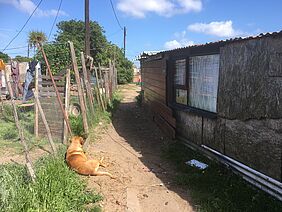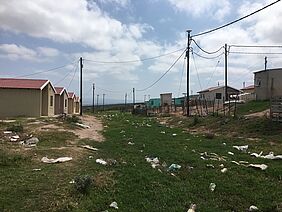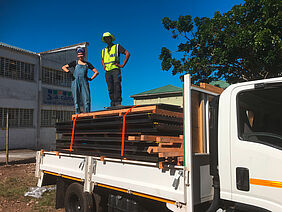Appointments are a rough orientation. „Now“ means „maybe, at some stage in the next few days“. You have good chance though when your „appointment“ tells you that he/she will see you „now, now, now“: You could be lucky to meet them within one hour. Translated into clock time it means that when the university schedule says „event is starting at 09:00“ definitely nothing happens before that. We, as prisoners of our german mindset, arrived just before nine. From the announced 450 participants roughly fifteen where there. We gave up at ten and worked (officially permitted of course) on other projects.
We had measured the sites for Janas thesis project and the JAP in February in Walmer Township two days before. Both sites were challenging in different ways. The thesis area is an empty patch of land framed by the road, houses on two sides and a grave yard in the back. The challenge here was that the area is currently used for dumping all kind of waste. And I mean ALL kind. We really did not want to know where (or what) we were walking on…
The JAP site is difficult in another way. It is located in the informally settled area of Walmer which means: people are just building the way they want. That is the reason why the road to Kustas house (which is going to be the project) is basically just a small path. But neighbours with randomly extended houses are not the only problem. The property itself is contorted with several smaller buildings (toilet, bower, …) and extensions to the actual shack. Water comes from a tap down the road, electrical power via a long cable from a pole which is located in a neighbouring garden. By the way: you can figure out the number of shacks in an area by counting the cables coming from the power poles.
Talking about power: This week we experienced the power shortage in PE for the first time. Unfortunately we did not know about this before we told our story in the evening to Janet. So on Thursday we kept moving around the city trying to find working plugs and WiFi. Lucky as we are we always ended up in the area of the town where the power was turned off in this exact moment.
On Friday there were also power cuts all over the city. This time though we had other things to do. Part of the event we were allowed to skip was the visit of a township in the north of PE where new housing is provided for people who were relocated by the municipality. Busses where supposed to leave at 8:30 in the morning. We reached at 8:30. It took us roughly 20 minutes to find the pick up area. Rushing and hoping that the busses were late we ran across the campus to find out that the busses were not even there yet.
It turned 09:00. Likhona, one of our fellow SA students arrived.
It turned 09:20. Some other people which looked like they could also belong to the site visit group settled down on the bench next to us.
It turned 09:30. A taxi* from one of the other participating universities arrived and we hoped for the best.
09:35. False alarm. The taxi just parked and waited with us.
09:40. Our taxis arrived. We jumped in.
09:50. We were finally starting. Almost one and a half hour later than expected. Welcome to South Africa. We really need to overcome the urge to be on time…
At least we did quite well with the power cuts this day. Prepared with fully charged laptops and cells we even got some work done in the evening! Good for us because on the following day we went to Cape Town. And we really did not want to do any work there.
*Taxis are not the kind of transport we know from Germany. Taxis here are minibusses that carry as many people as they can (not necessarily as they are allowed to).


